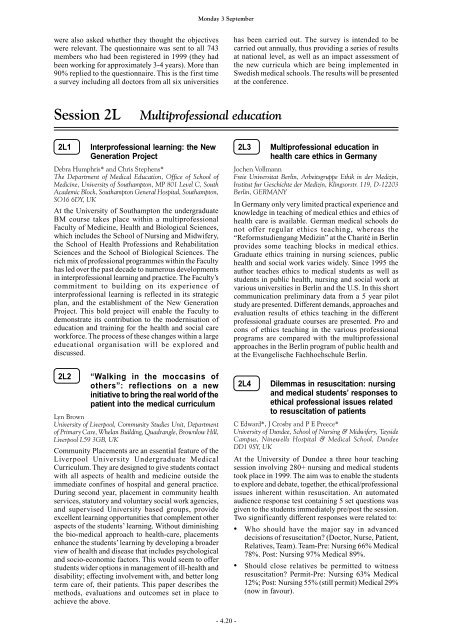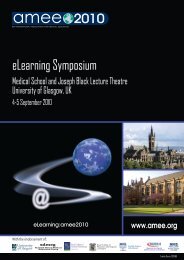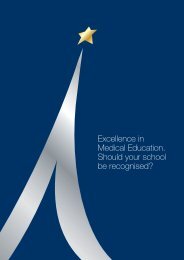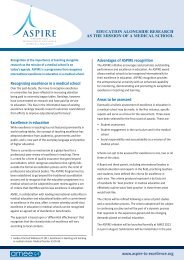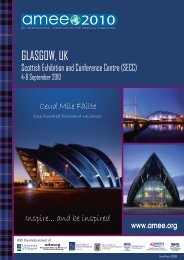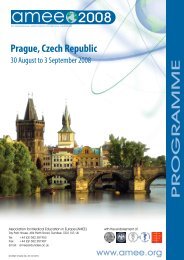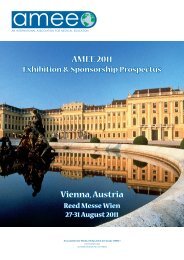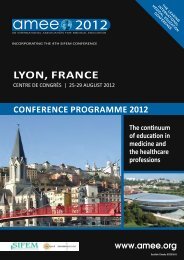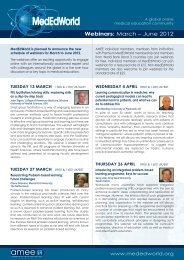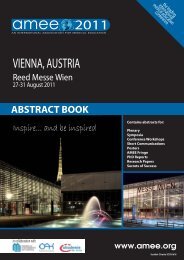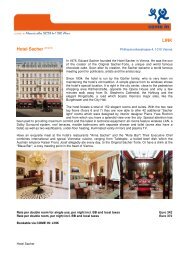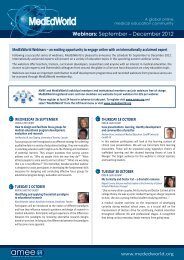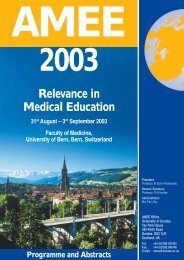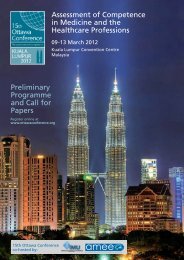AMEE Berlin 2002 Programme
AMEE Berlin 2002 Programme
AMEE Berlin 2002 Programme
Create successful ePaper yourself
Turn your PDF publications into a flip-book with our unique Google optimized e-Paper software.
were also asked whether they thought the objectives<br />
were relevant. The questionnaire was sent to all 743<br />
members who had been registered in 1999 (they had<br />
been working for approximately 3-4 years). More than<br />
90% replied to the questionnaire. This is the first time<br />
a survey including all doctors from all six universities<br />
Session 2L Multiprofessional education<br />
2L1 Interprofessional learning: the New<br />
Generation Project<br />
Debra Humphris* and Chris Stephens*<br />
The Department of Medical Education, Office of School of<br />
Medicine, University of Southampton, MP 801 Level C, South<br />
Academic Block, Southampton General Hospital, Southampton,<br />
SO16 6DY, UK<br />
At the University of Southampton the undergraduate<br />
BM course takes place within a multiprofessional<br />
Faculty of Medicine, Health and Biological Sciences,<br />
which includes the School of Nursing and Midwifery,<br />
the School of Health Professions and Rehabilitation<br />
Sciences and the School of Biological Sciences. The<br />
rich mix of professional programmes within the Faculty<br />
has led over the past decade to numerous developments<br />
in interprofessional learning and practice. The Faculty’s<br />
commitment to building on its experience of<br />
interprofessional learning is reflected in its strategic<br />
plan, and the establishment of the New Generation<br />
Project. This bold project will enable the Faculty to<br />
demonstrate its contribution to the modernisation of<br />
education and training for the health and social care<br />
workforce. The process of these changes within a large<br />
educational organisation will be explored and<br />
discussed.<br />
2L2 “Walking in the moccasins of<br />
others”: reflections on a new<br />
initiative to bring the real world of the<br />
patient into the medical curriculum<br />
Lyn Brown<br />
University of Liverpool, Community Studies Unit, Department<br />
of Primary Care, Whelan Building, Quadrangle, Brownlow Hill,<br />
Liverpool L59 3GB, UK<br />
Community Placements are an essential feature of the<br />
Liverpool University Undergraduate Medical<br />
Curriculum. They are designed to give students contact<br />
with all aspects of health and medicine outside the<br />
immediate confines of hospital and general practice.<br />
During second year, placement in community health<br />
services, statutory and voluntary social work agencies,<br />
and supervised University based groups, provide<br />
excellent learning opportunities that complement other<br />
aspects of the students’ learning. Without diminishing<br />
the bio-medical approach to health-care, placements<br />
enhance the students’ learning by developing a broader<br />
view of health and disease that includes psychological<br />
and socio-economic factors. This would seem to offer<br />
students wider options in management of ill-health and<br />
disability; effecting involvement with, and better long<br />
term care of, their patients. This paper describes the<br />
methods, evaluations and outcomes set in place to<br />
achieve the above.<br />
Monday 3 September<br />
- 4.20 -<br />
has been carried out. The survey is intended to be<br />
carried out annually, thus providing a series of results<br />
at national level, as well as an impact assessment of<br />
the new curricula which are being implemented in<br />
Swedish medical schools. The results will be presented<br />
at the conference.<br />
2L3 Multiprofessional education in<br />
health care ethics in Germany<br />
Jochen Vollmann<br />
Freie Universitat <strong>Berlin</strong>, Arbeitsgruppe Ethik in der Medizin,<br />
Institut fur Geschichte der Medizin, Klingsorstr. 119, D-12203<br />
<strong>Berlin</strong>, GERMANY<br />
In Germany only very limited practical experience and<br />
knowledge in teaching of medical ethics and ethics of<br />
health care is available. German medical schools do<br />
not offer regular ethics teaching, whereas the<br />
“Reformstudiengang Medizin” at the Charité in <strong>Berlin</strong><br />
provides some teaching blocks in medical ethics.<br />
Graduate ethics training in nursing sciences, public<br />
health and social work varies widely. Since 1995 the<br />
author teaches ethics to medical students as well as<br />
students in public health, nursing and social work at<br />
various universities in <strong>Berlin</strong> and the U.S. In this short<br />
communication preliminary data from a 5 year pilot<br />
study are presented. Different demands, approaches and<br />
evaluation results of ethics teaching in the different<br />
professional graduate courses are presented. Pro and<br />
cons of ethics teaching in the various professional<br />
programs are compared with the multiprofessional<br />
approaches in the <strong>Berlin</strong> program of public health and<br />
at the Evangelische Fachhochschule <strong>Berlin</strong>.<br />
2L4 Dilemmas in resuscitation: nursing<br />
and medical students’ responses to<br />
ethical professional issues related<br />
to resuscitation of patients<br />
C Edward*, J Crosby and P E Preece*<br />
University of Dundee, School of Nursing & Midwifery, Tayside<br />
Campus, Ninewells Hospital & Medical School, Dundee<br />
DD1 9SY, UK<br />
At the University of Dundee a three hour teaching<br />
session involving 280+ nursing and medical students<br />
took place in 1999. The aim was to enable the students<br />
to explore and debate, together, the ethical/professional<br />
issues inherent within resuscitation. An automated<br />
audience response test containing 5 set questions was<br />
given to the students immediately pre/post the session.<br />
Two significantly different responses were related to:<br />
• Who should have the major say in advanced<br />
decisions of resuscitation? (Doctor, Nurse, Patient,<br />
Relatives, Team). Team-Pre: Nursing 66% Medical<br />
78%. Post: Nursing 97% Medical 89%.<br />
• Should close relatives be permitted to witness<br />
resuscitation? Permit-Pre: Nursing 63% Medical<br />
12%; Post: Nursing 55% (still permit) Medical 29%<br />
(now in favour).


